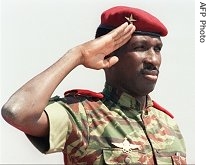2007年VOA标准英语-Film Festival Examines Human Rights in Central
搜索关注在线英语听力室公众号:tingroom,领取免费英语资料大礼包。
(单词翻译)
By Phuong TranDakar
23 May 2007
The first international human rights film festival to take place in Bangui, Central African Republic, has ended. During the week-long festival, about 15,000 people saw 10 films. Festival organizers say they were under pressure to cancel screenings of one controversial film. But they say this shows that the country needs more opportunities to talk about its human rights record. Phuong Tran has more from VOA's Central and West African Bureau in Dakar.
 |
| Captain Thomas Sankara, President of Burkina Faso (file photo) |
The film examines the policies of the former leader, sometimes called the Che Guevara of Africa. His revolutionary program, including a fight against corruption4 and improving the status of women, provoked strong opposition5 from traditional leaders.
Some African leaders still see Mr. Sankara's legacy6 as a threat.
"This film, in particular, has been the source of a certain tension here, [but] we screened it as many times as we had planned we would," said festival director Mercier. "So it shows a human rights festival here is possible, but it is not all that consensual, which is why we are here."
For the past five years, the festival had been held in Paris. Organizers say they wanted to show films to Central Africans that they would not otherwise see.
The festival screened the film about Mr. Sankara five times in public and private venues7.
"All the places are crowded," said Mercier. "There is a strong appetite for the population to talk about those different things, human rights, liberty of freedom of speech, freedom of the media, as well as social and economic rights."
Central African human rights lawyer and festival president Edith Douzima says the festival's films reflect issues that Central Africans face, but do not always acknowledge.
She says the films help Central Africans see more clearly their own human rights situation and look for abuses.
During the festival, the Hague-based International Criminal Court announced it is launching an investigation8 into possible war crimes committed five years ago in Central African Republic, when former president Ange-Félix Patassé fought a coup attempt by current president Francois Bozize.
Lawyer Douzima says the Central African human rights community welcomes the start of the investigation. She says it is fortunate that the international court made the announcement during the festival.
The human rights lawyer says the announcement sends a strong message to victims of the coup's suppression, as well as to past, current and future war criminals that human rights abuses will not be tolerated in Central African Republic.
 收听单词发音
收听单词发音 




